GamesRadar+ Verdict
Arydia is a communally focussed and highly enjoyable TTRPG/board game hybrid that treads lightly on the roleplay, and heavy on the gubbins. It's intimidating to set up initially and to reset the game, but with great rules, easy save and drop-in/out mechanics, and simple cube tracking systems, it's a lot easier to pick up and play than you might expect.
Pros
- +
Real sense of communal energy
- +
Exploring is great fun
- +
Layered tactical combat
- +
Clear interactables
Cons
- -
Restrictive roleplay
- -
Trope heavy
- -
Easy to exploit
- -
Indexing and setup is a big hurdle
Why you can trust GamesRadar+
Coming to Arydia: The Paths We Dare Tread as a longtime D&D player and CRPG lover, I thought I'd need to curb my expectations. A TTRPG board game hybrid could never deliver the kind of experience a theatre-of-the-mind tabletop RPG could… or so I thought. And while I wasn't entirely wrong in my assumptions, Arydia has managed to deliver something Dungeons & Dragons hasn't quite been able to for me. That's mostly thanks to the game's lack of Game Master or referee, which has a way of amplifying that sense of community spirit you usually get from the best tabletop RPGs.
So what else can you expect from a GM-less tabletop RPG board game hybrid? Well, it's a fantasy themed RPG board game that takes cues from the likes of the Monster Hunter World board games and Gloomhaven, along with some of the best board games around, and puts them on steroids when it comes to the number of pieces needed to keep track of everything. Arydia has so many pieces that even my cards have cards – I'm serious. There's d20s, custom hit dice, markers, trackers, tokens, slipcases, and chests for each Path to keep the good stuff hidden until later. Not to mention the metric-ton of miniatures.
If you can look past the initial dread of setting up a campaign with a box large enough to kill a wild boar, you're in for a mini-battling, riddle solving, tech-tree advancing good time. Provided you can afford the price of admission.
Arydia features & design
Price | $240 |
Ages | 14+ |
Game type | Board game TTRPG hybrid / dungeon-crawler |
Players | 1 - 4 |
Lasts | 60 - 240 mins (Campaign may be hundreds of hours) |
Complexity | Moderate |
Designers | Cody Miller, Ira Fay |
Publisher | Far Off Games |
Play if you enjoy | Gloomhaven, HeroQuest, RPGs and legacy games, Monster Hunter Wilds |
- Make a character and advance them with new abilities, higher stats, and gear
- Navigate a world fraught with peril and stepped in intrigue
- Battle, search, and riddle your way across unexplored lands
Arydia is, for all intents and purposes, a GMless tabletop roleplaying game. It's a legacy game that sees players working together as a collective to earn experience points as they discover the world around them through encounters, and journey across a little hex world map to reveal new areas that they can explore in detail. To make up for the lack of Game Master, Arydia comes with a host of cards (like a super extensive oracle for solo tabletop roleplayers) that dictate what happens and where. There's a suit to govern NPCs and how they act, events and their outcomes, foes and their abilities, and an indexing system for easy storing, finding, and tracking of cleared cards as the story unfolds. Map pieces are all indexed, and organized into their various shapes and sizes, with a triple-layer world map with pop-out hexes and a small metal counter to track the party's position throughout their journey.
Before anything kicks off, one unfortunate soul must dive into the box to unpack and identify the masses of different pieces. Going through the instruction manual, you'll find a well organised, step-by-step guide that sees you through as you slip dividers into card index boxes, organise the play area, and doll out each player characters' starter gubbins.
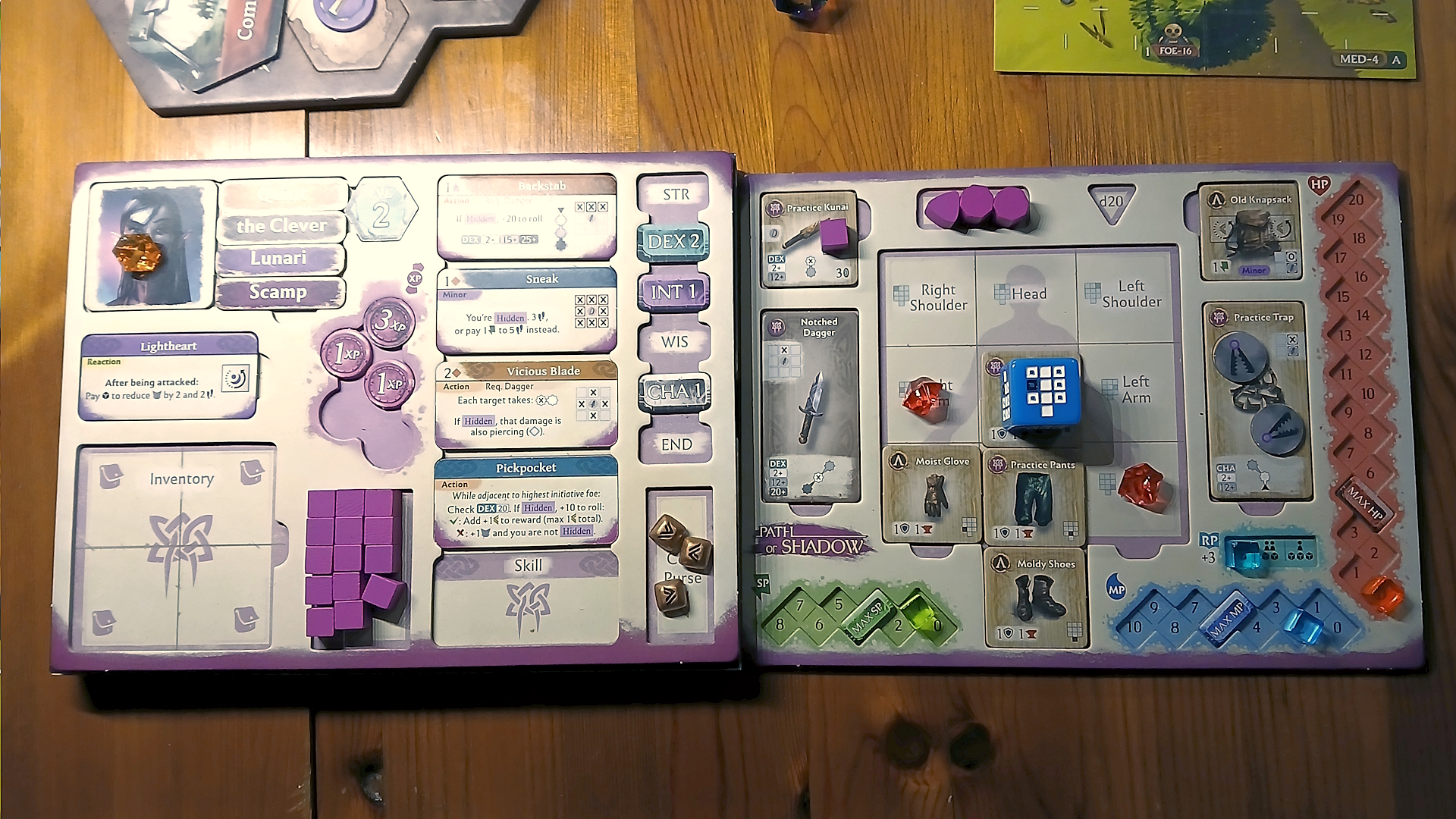
As for players, their first port of call is setting up a character. They'll choose from a host of names and starter titles to form a basis, then pick a character (basically a species) and a Path to follow. The latter two dictate your character's starter abilities, with your choice of Path opening your character up to their ability tree. Paths are similar to a class, for those who've got the best D&D books in their arsenal. Paths also dictate your starting gear, which includes some basic weaponry and maybe a mouldy glove (very literal rags to riches vibes). Once players have all capped off and marked their max stats, they get to pair one of the pre-painted minis with a set of swappable heads so you can mix and match your character's species with its Path garb.
Throughout the game, players will take it in turns to read off cards as their compatriots interact with the world of Arydia, gaining RP tokens as they enact the will of the game. Shifting their minis around the maps as they are revealed, they'll have plenty of chances to chat with NPCs and interact with Points of Interest, which might lead to new Events or unlock Jobs that can be turned in for loot. It may also see players getting into a tussle, at which point you need to shift from Adventure mode into Combat mode, and get out the Threat/Combo Tracker. As well, this is when you get to break into one of several advent calendar-style boxes riddled with minis of all shapes and sizes.
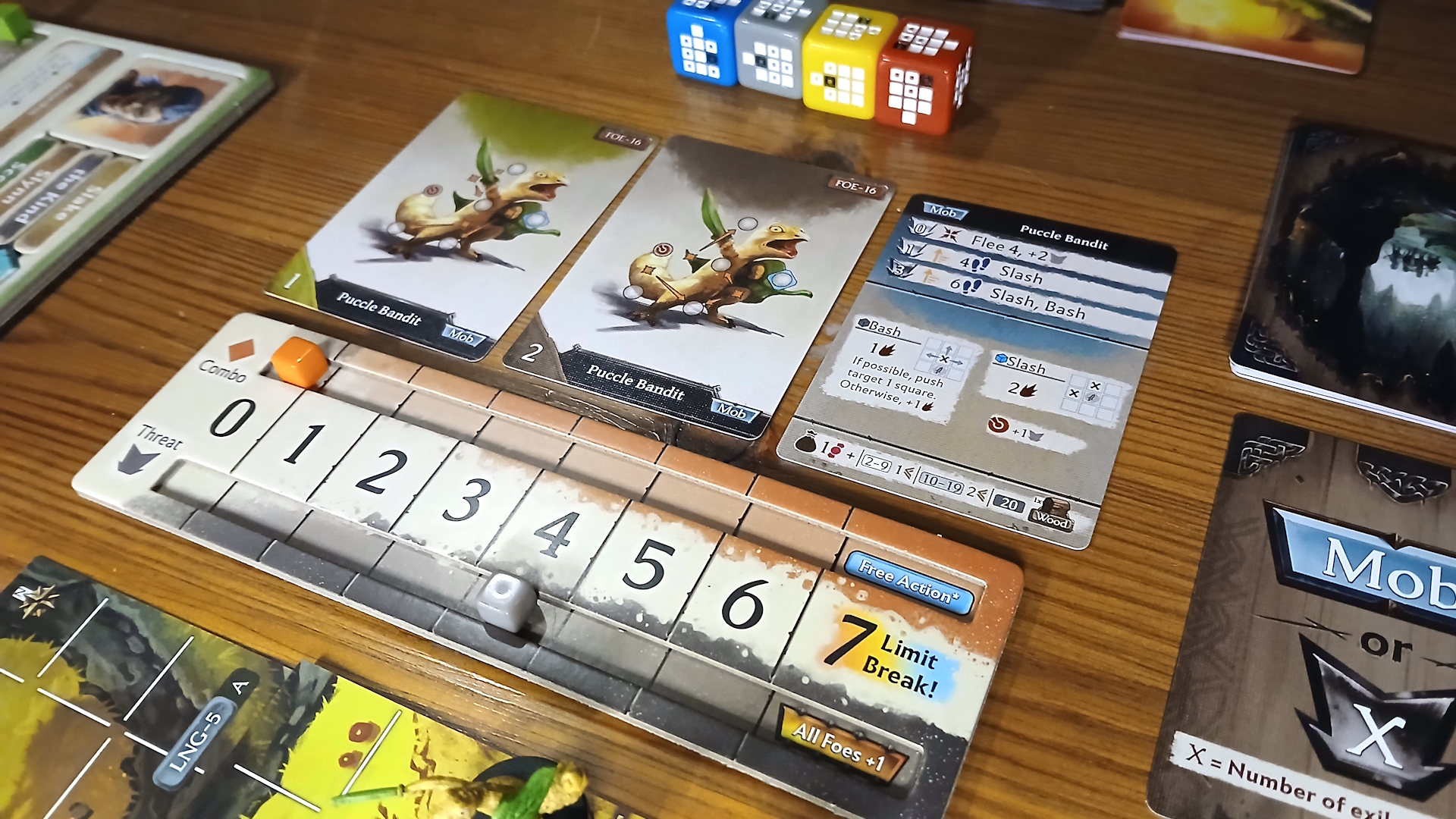
In combat, Foes are split into Mobs and Bosses, and are programmed with AI cards to do certain things on their turn depending on how much the Threat level has increased. Initiative is a little odd in that Foes only activate when the Threat Deck calls upon them. Aside from the damage maps featured on each Foe card – which give you options as to where to swing at them depending on the pattern of attack your weapon makes – there's several levels to combat over the usual "I hit the thing until it dies." Weak points, for example, resolve certain effects on a Foes card and could result in an increased Threat level. A topped-out Threat bar means it's time for a Limit Break. For baddies, that means increased damage and activation for all foes – which you really don't want. Meanwhile, you and your pals are trying to increase your Combo level: basically a free action, so too are your enemies.
Player turns are a combination of normal, minor and free actions, such as moving (minor) or a basic attack (normal), or using a skill which could be any of the three. All this is tracked by placing action cubes on the thing you want to use on your player mat, and then resolving that action. There are rules for how melee and ranged weapons work through certain borders on the maps, as well as difficult and impassable terrain. There are even rules around armor wear, and hit dice that dictate where on your character takes damage.
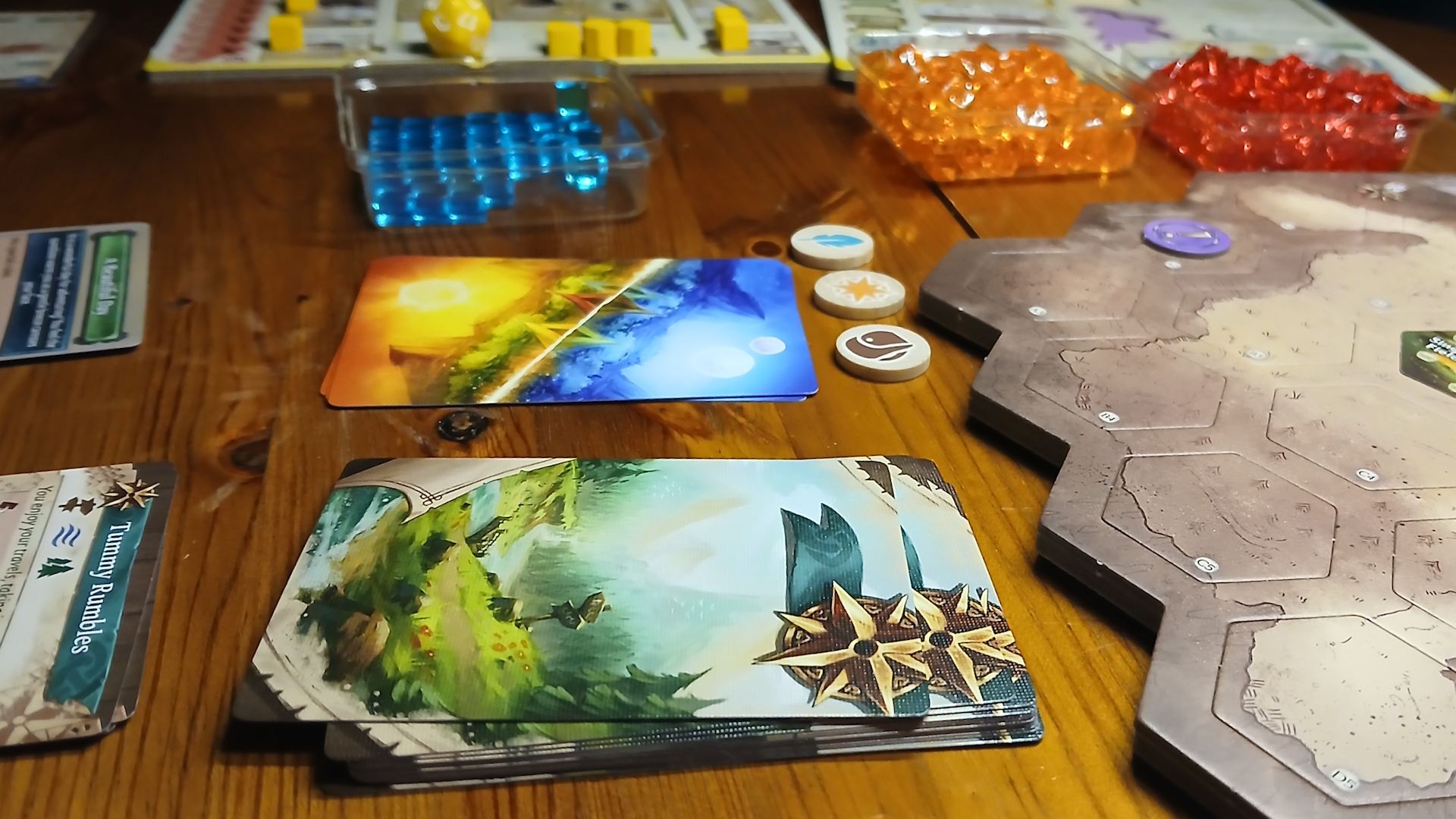
The other major mechanic in Arydia is travel. Swapping to the World Map to enter new regions, you'll be milling through the Travel Deck to navigate the perils of the road that could exhaust players' Travel Tokens. All you have to do to move to a new hex is pop your counter between it, noting the terrain type, draw a travel card, and play out whatever is on the section marked with that terrain type. Once you're all out of energy, or low on health, it's time to rest. That involves moving through the Day deck, which tells you how things went in the night and how the party is feeling in the morning. Much like the Travel and Threat decks, it will evolve and grow less accommodating as the game goes on.
Leveling up is where all your hard work comes to a head, and is achieved at a rest stop by exchanging XP gained during play. Everyone levels up at the same time, ticking off their chosen stats to increase on their character advancement sheets. Then you get to pick a new ability from your Skill Tree. There are even mechanics for dropping in and out of sessions, allowing other players who have been absent to catch up with levels gained.
Gameplay
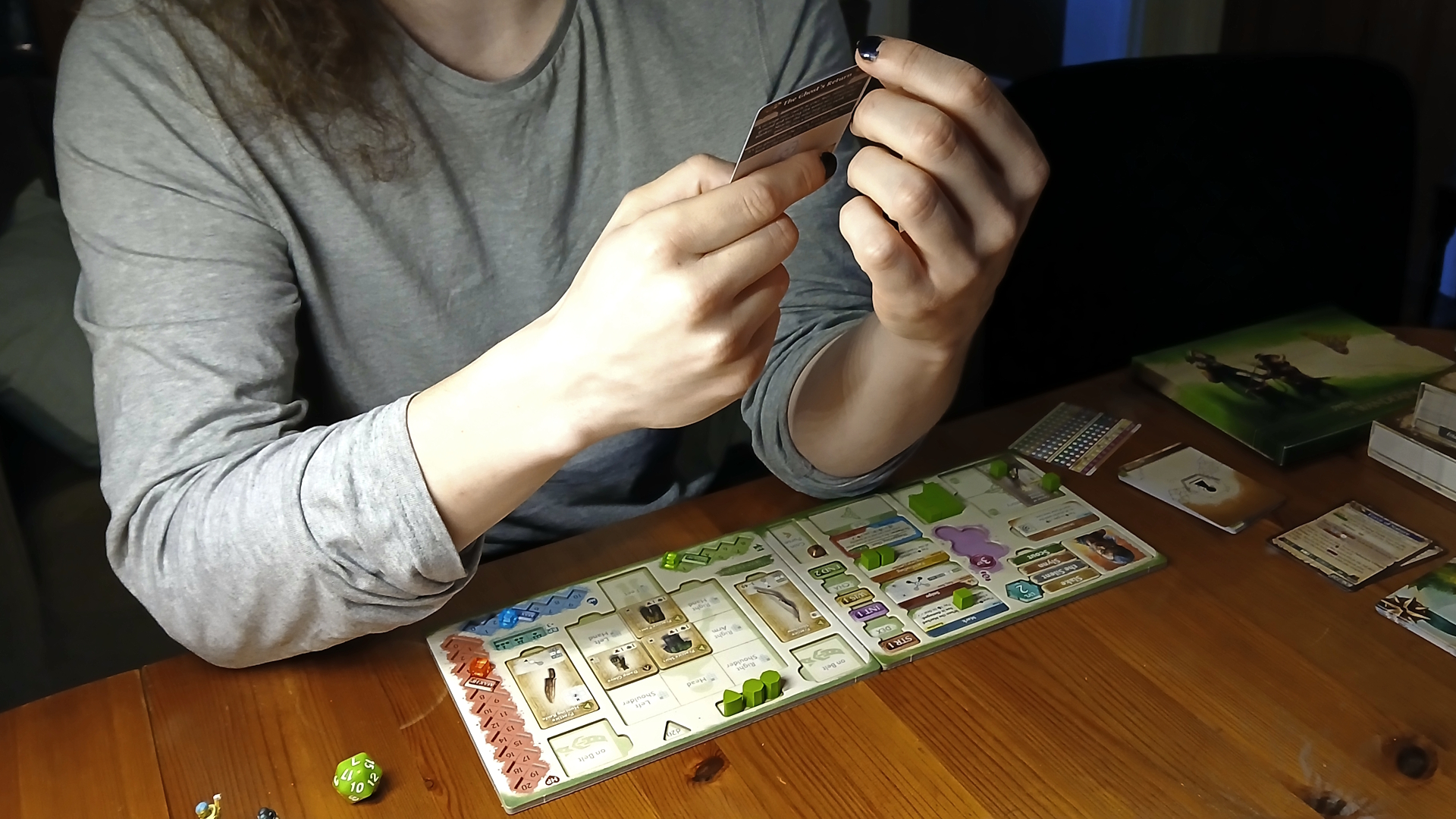
- Roleplay with NPCs can feel on-rails but exploration is great fun
- Easy to exploit but there are attempts to curb overpowered characters
- Strategic multi-layered combat keeps things fresh
The main draw for a game like Arydia is the comprehensive nature of the full-box experience. Everything you need to play comes picked, packed, and almost ready to play. There's no footwork needed to collect minis, set pieces, or even dice together, which takes a lot of weight out of the prep for a deep and lengthy campaign game. That said, there are a couple of big hurdles upfront: unpacking and learning the indexing system.Someone will have to do it, and it can be a bit daunting.
Once you have that down, and you understand where to place cards once they're completed, the game kind of falls into place. It took about 5 hours from the initial unboxing for everything to click into place which, considering this is a multi-session campaign game expected to last hundreds of hours, really isn't that long. And the rulebook – while it does have extremely tiny margins – is well laid out enough that finding a specific rule when you get stuck is easy. There's even a handy guide for each and every Path, so you can learn to fight with your specific character's own skill set.
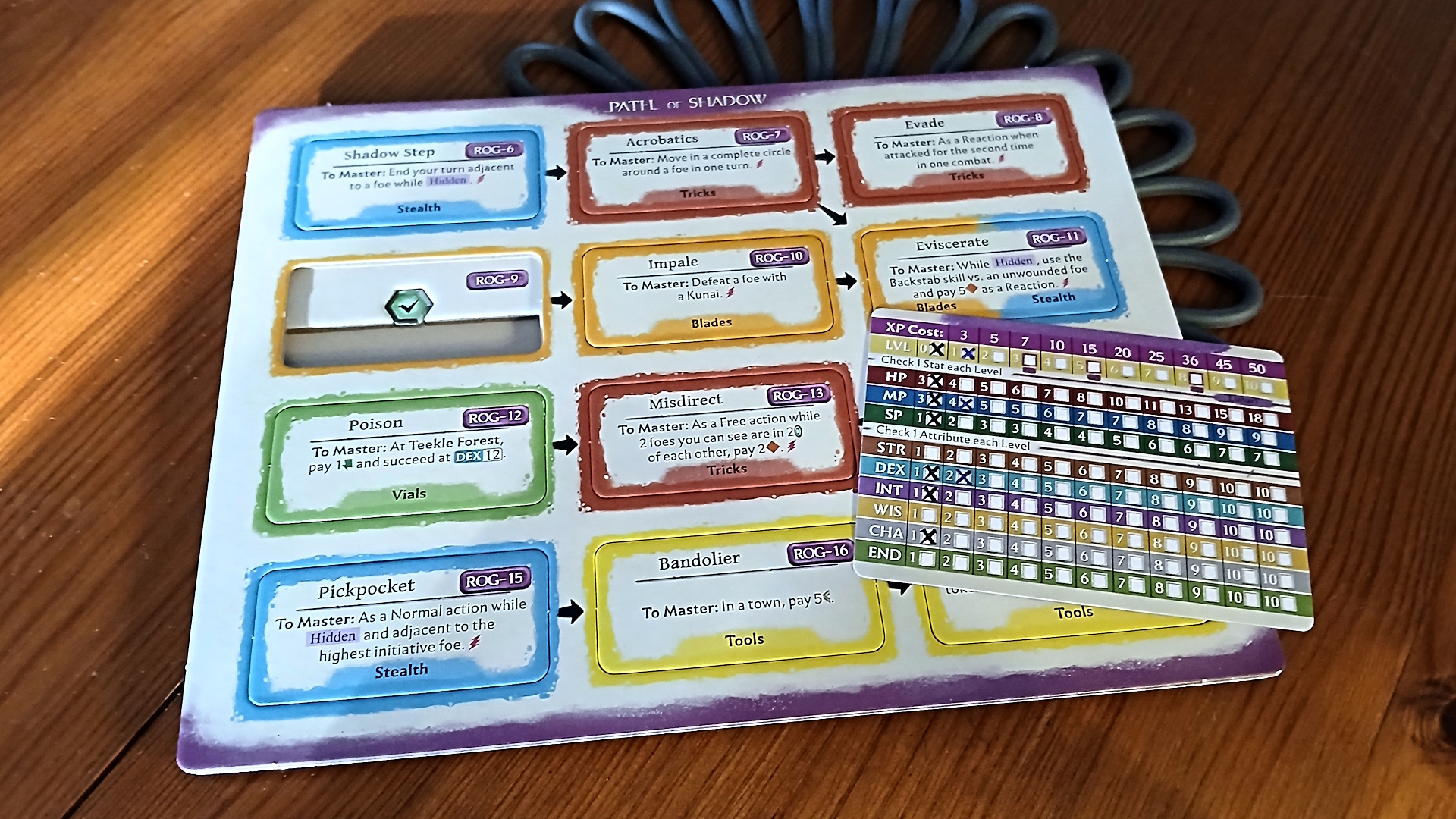
The learning to fight was the strangest part of the initial session, with everyone walking through their own version of the same tutorial fight. It's the only time the game has felt really insular (antisocial even) as we were all ignoring each other for about 20 minutes. But again, that isn't long to learn compared to the several sessions it took me to figure out Pathfinder's battle system. Afterwards, we were able to reconvene and try out some low-stakes battles to get a feel for it, which is something Arydia excels in: that slow drip feed of information. I never felt overwhelmed with the step-by-step ruleset, and since each player seems to take something different away from the tutorial it's easy to learn from one another as you go.
Character creation is a lot of fun, especially when someone in your party cooks up something like "Slake the Silent Slynn Scout", and while the Paths bear many similarities to the archetypal rogue, fighter, wizard etc. each Arydian Path has its own flair. While you don't necessarily get to create your own backstory as you might with D&D, every Path starts with its own key item to create a sense of intrigue and give you a chance to play out a satisfying character arc.
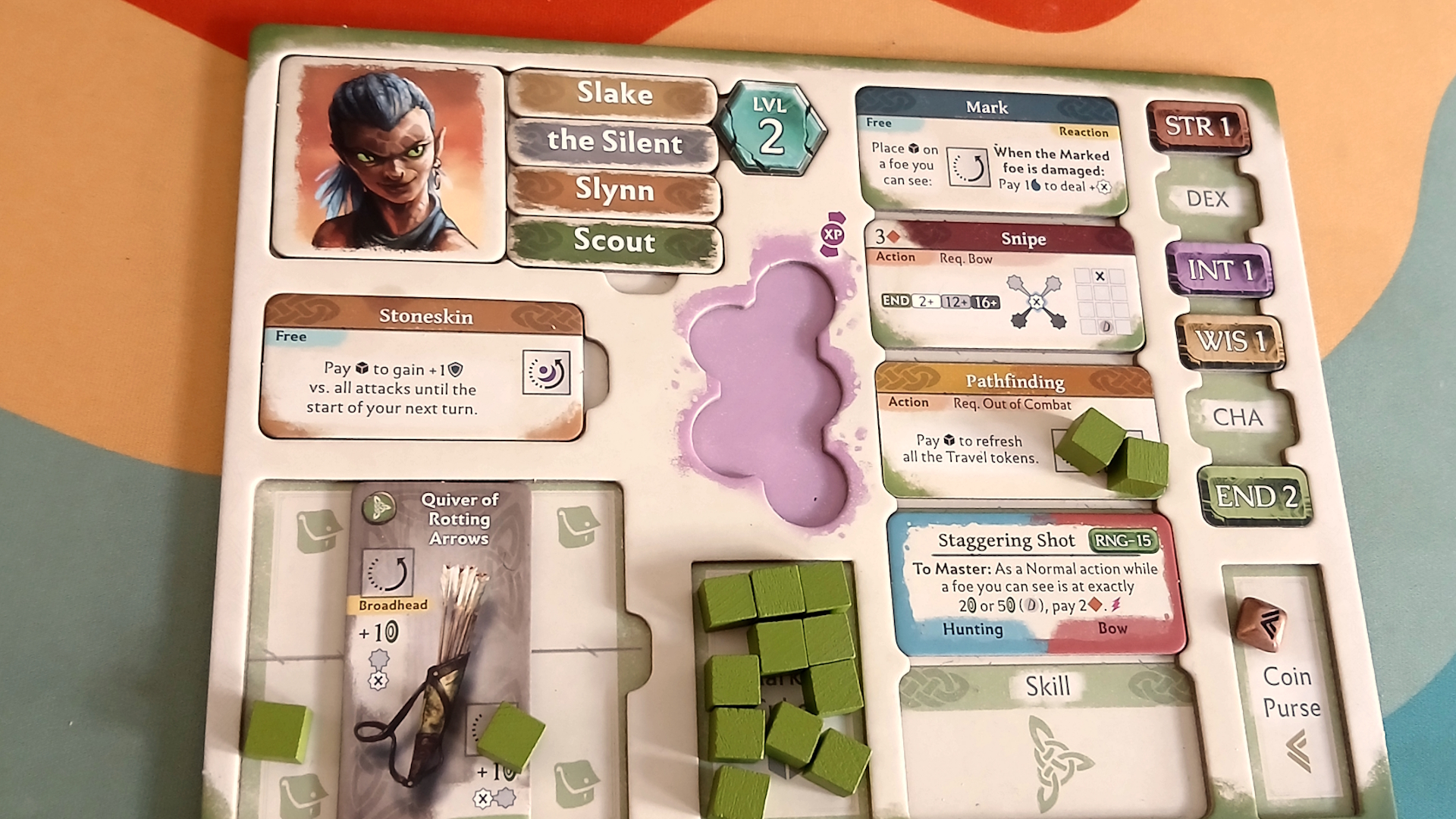
Chatting with NPCs can feel very on-rails in Arydia, but the roleplay-light nature of this kind of game is a small sacrifice for a coherent storyline. And there's plenty of opportunity for your characters to roleplay together as they form bonds along the journey – there's just no active encouragement. Getting to certain points in an NPC's dialogue as the Guide does result in RP points, which can be spent like inspiration to improve an attribute check, but you only feel like you've earned them if you go all-out on roleplaying the character which is entirely optional. Still, with no one player acting as the Game Master all the time, everyone at the table takes responsibility for the fun at the table.
That communal spirit is punctuated by the fact that everyone gets a chance to act as a guide, find map pieces to slot together, and be equally surprised when a new mini is revealed. Since all players simultaneously gain XP, there's no leapfrogging one another and you can all enjoy a level-up session where you get to discuss tactics as you evolve your character together.
Should you buy Arydia?
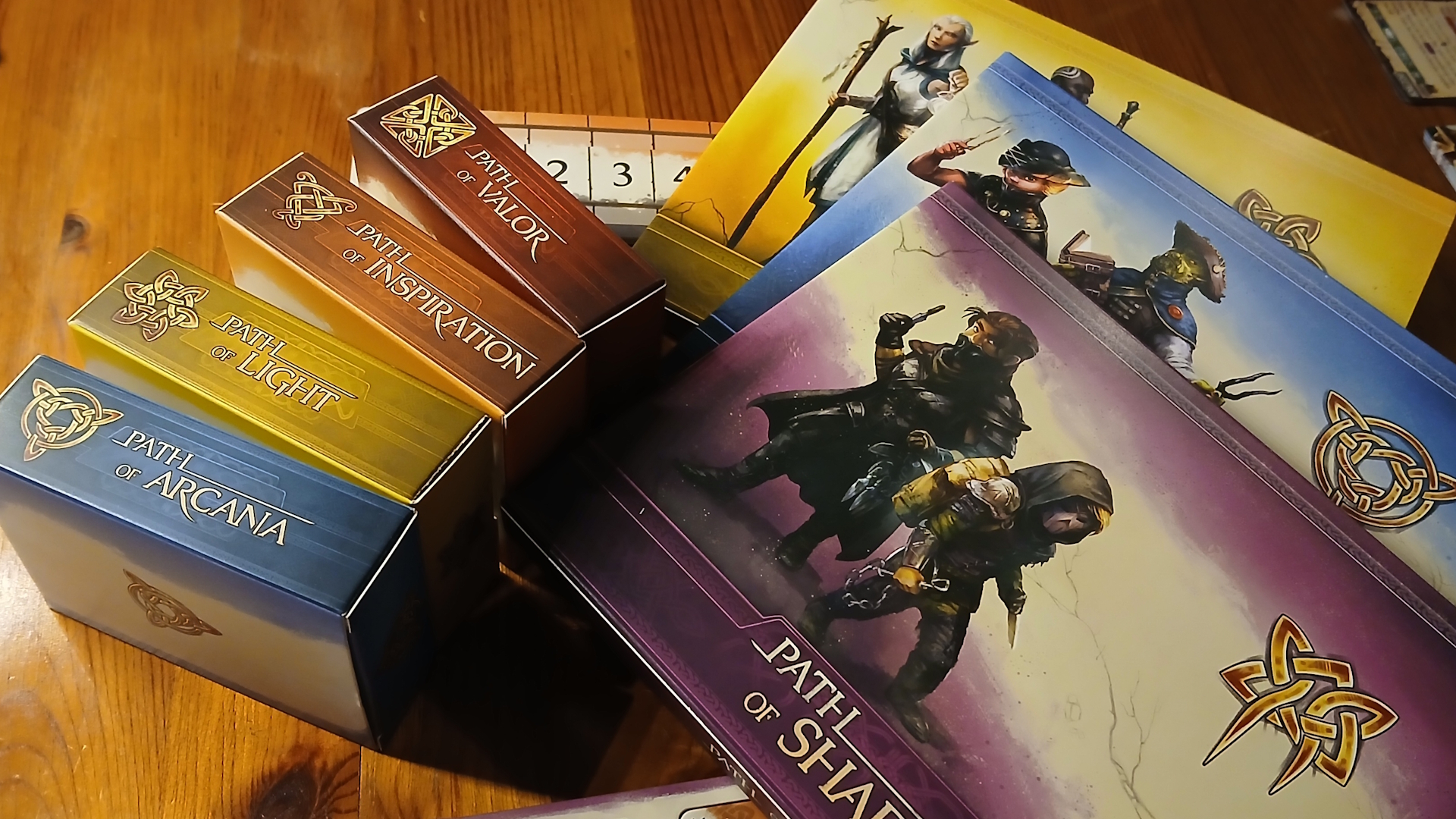
Arydia: The Paths We Dare Tread provides a collaborative space for GM-less gameplay of a kind of gravity I've not experienced from other games. It manages to give everyone at the table an equal share in the revelations and surprises a GM would otherwise miss out on, which is something D&D can't match. Not to mention there's no need for a Game Master to spend several days prepping for a single session.
A game like this inevitably makes sacrifices to keep everything ticking along, such as the lack of customisable character backstory and roleplay restrictions, but it makes up for it with a real sense of community spirit and cracking combat system. Top that with interesting NPCs, a whole host of interesting locations to explore, and a storyline that starts slow and builds to some wild crescendos, Arydia really has a lot going for it.
Ratings
Category | Notes | Score |
|---|---|---|
Game Mechanics | Maybe too granular for some, but combat mechanics and advancement in particular are deftly applied | 4/5 |
Accessibility | Some massive barriers to entry with indexing and other complexities, but generally easy to learn for players | 3/5 |
Replayability | Branching narratives give it some replayability, but the idea of resetting all those pieces after a long campaign is super daunting | 2/5 |
Setup & pack down | One of the biggest hurdles, setup takes a long time and you need a surgeon's map to pack up again | 3/5 |
Component quality | Amazing triple-layer boards with popouts, though the pre-painted minis look a bit rushed | 4/5 |
Buy it if...
✅ You prefer clearly defined interactables: Arydia makes it easy to distinguish what can and cannot be changed or interacted with. It's great for those who find TTRPGs a little too open-ended.
✅ You want a layered combat system: Multi-layer combat with limit breaks and directional attack patterns make Arydia's combat system super interesting. And with heaps of new abilities to unlock, I can't wait to see what my character can do.
Don't buy it if...
❌ You're looking for something roleplay heavy: Arydia actively discourages ad-libbing. As much as it's a game of branching narratives, it has to keep you vaguely on track. It's less for people who feed off the kind of free-creative improvisation that most TTRPGs allow for.
❌ You're trying to save money: The game cost is substantial enough to put even Warhammer players off.
How we tested Agricola
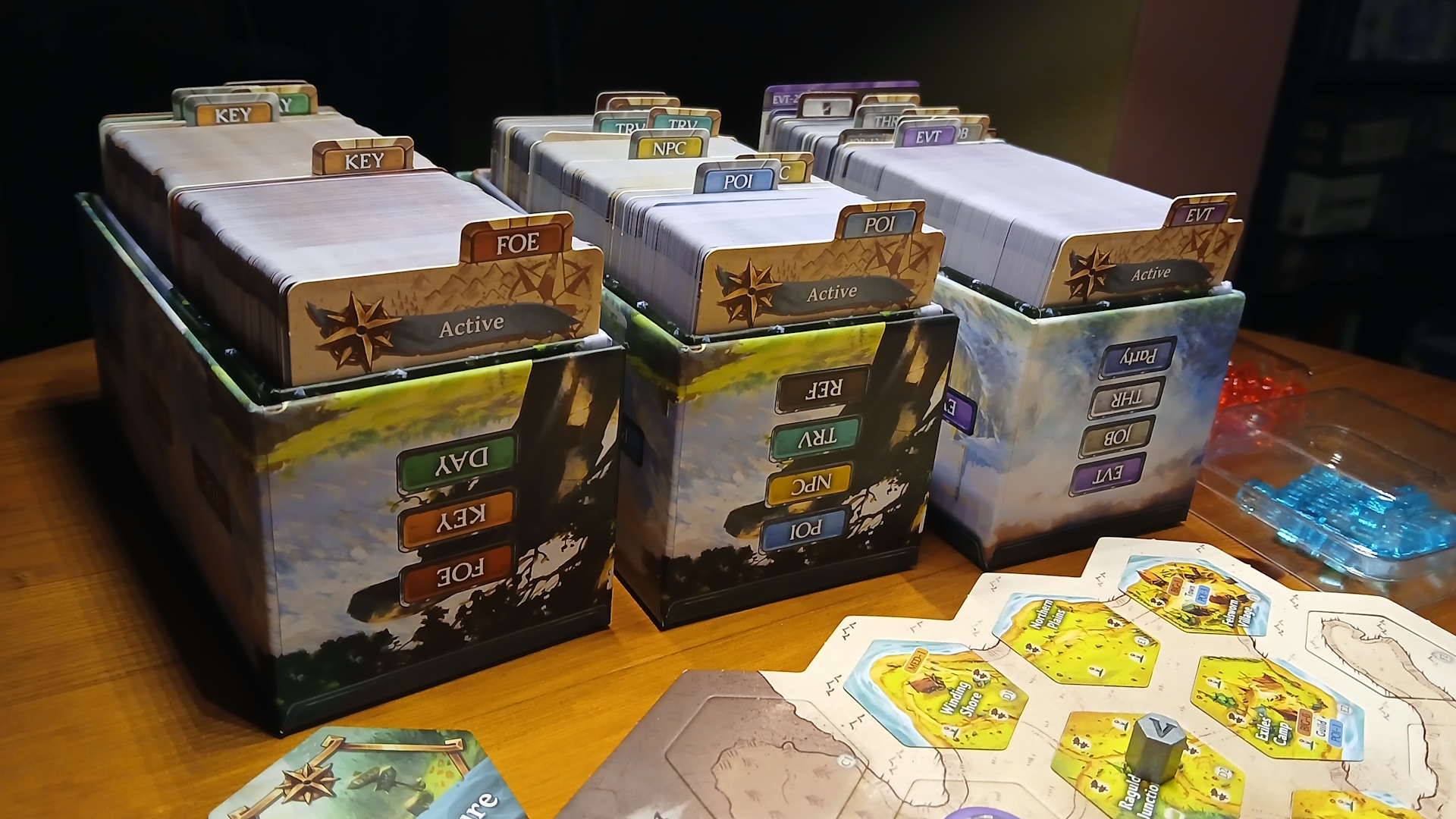
Disclaimer
This review was conducted using a press copy of the game.
I played Arydia numerous times, through 3-5 hour sessions at a time. I tried it with different player counts over a course of weeks to get the most complete overview of its gameplay and longevity. I made sure to attempt different tactics, and gave it the old game-breaking test ringer.
For a more in-depth look at our process, see this guide on how we test board games. You can also find out more via GamesRadar+ reviews policy.
Want something that lets you work as a team? Don't miss the best cooperative board games. As for those wanting a head-to-head challenge, try the best 2-player board games.

Katie is a freelance writer with almost 5 years experience in covering everything from tabletop RPGs, to video games and tech. Besides earning a Game Art and Design degree up to Masters level, she is a designer of board games, board game workshop facilitator, and an avid TTRPG Games Master - not to mention a former Hardware Writer over at PC Gamer.
You must confirm your public display name before commenting
Please logout and then login again, you will then be prompted to enter your display name.



